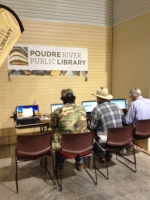Libraries as First Responders
Poudre River Public Library District, Colo.
Innovation Synopsis
The first day of a devastating wildfire, Poudre River Public Library District went to work as a first responder by bringing information and relaxation to 1,000’s of evacuated library customers, thus positioning the library as a strategic partner in the emergency plan.
Challenge/Opportunity
The High Park Fire in June of 2012 (Larimer County, Colorado) went from a plume of smoke to 20,000 acres of burning timber in 24 hours. Within a week over 53,000 acres were aflame and over 3,000 people were evacuated from their homes. The fire occurred the week before the Library District’s summer reading kickoff in the mountain communities where the fire occurred. One of the summer reading program sites was a local fire station that became the operations center for the fire fighters. Staff’s first thought as people were evacuated was that they will need access to up-to-date information. Librarians find the answers – this is our area of expertise. As one of the first responders the Library had the value-added advantage of having available for immediate transfer to the evacuation center a mobile computer lab, storytime props, books and willing staff and volunteers. As part of the changing role of librarianship, the Outreach Services staff and other employees found a way to bring services directly to the displaced residents, positioning the Poudre River Public Library District as an essential community organization.
Key Elements of Innovation
The first day of the fire, the blaze forced over 1,000 people to be sent to the evacuation center. Evacuees lacked up-to-date information about the extent of the fire and how best to notify loved ones. The Library District quickly responded by contacting the Larimer County communications office for permission to set-up a laptop lab and to bring books and toys for the children to the evacuation center. The decision-makers gladly found space for the computers and for storytimes and quiet play. Library staff projected the local newscast and current fire maps on the wall for quick and easy viewing. The flexibility and determination of Outreach Services staff to contribute in a meaningful way to the emergency was much appreciated by other first responder agencies. The Red Cross found the library staff especially helpful in assisting non-computer users in registering on their Safe and Well site so they could be found by friends and family. Working with other first responder agencies the library staff working on-site served as liaisons to the District by emailing updated information from the daily briefings. A centralized information page was created on the library website. Staff and customers sometimes received information even before it was broadcasted by the local media. The importance of vetted information in an emergency situation became extremely important as bogus websites and twitter feeds popped up.
Achieved Outcomes
Libraries are responsive and relevant. The library can and should respond to a community crisis with trained staff, resources and information management. Library staff became the go-to people during the crisis for evacuated families by providing programs for the children and a colorful space for individual and group play. Stuffed animals and books were donated by the truckload by individuals and non-profit agencies. The Red Cross and other responders directed evacuees to the computer lab to find information or to the children’s area during the long hours of waiting for updates. We learned valuable lessons of managing in an emergency and gained positive press as a result of our efforts. Our response required the involvement of many people: staff working quietly behind the scenes to secure resources and post information, as well as on-site staff and volunteers providing direct services to evacuees. Many of the lessons were learned on-the-go. Staff was given the authority to make swift decisions as needed such as quickly moving operations to a larger emergency center with little notice. The result was not only the satisfaction of serving so many of our evacuated patrons, young and old, but knowing that the public in general and the other first responders and agencies discovered that the local library was able and willing to assist the community in crisis.



